News from Maison de la Gare
From the Streets to the Dojo
Tweeter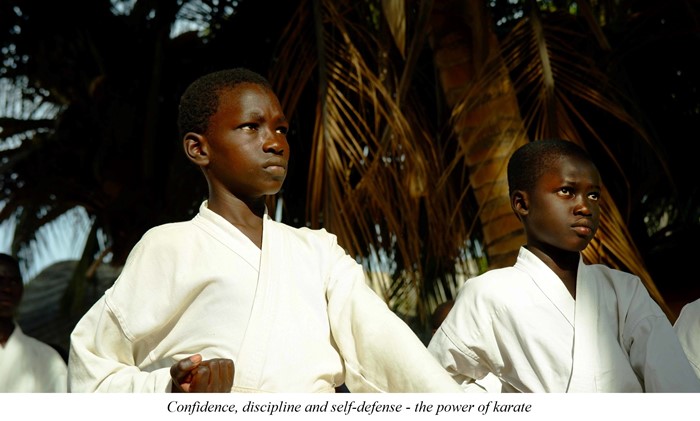
Amadou and Aliou’s stories show how karate opens positive horizons for begging talibé street children
The karate program at Maison de la Gare provides a vital lifeline for many begging talibé children
in Saint Louis. These children typically have no access to education at home and are sent to
daaras in the cities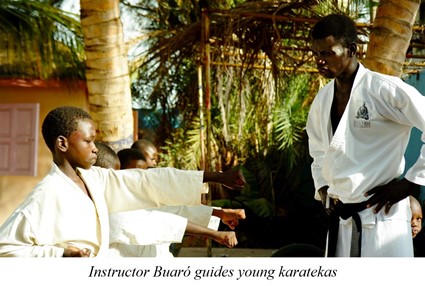 to learn the Quran. All too often, they are instead forced to beg on the
streets for their food and for money for their marabout. It's a difficult and precarious life but,
thanks to Maison de la Gare’s programs and caring staff, many of them have found a place where
they can learn, play, and grow.
to learn the Quran. All too often, they are instead forced to beg on the
streets for their food and for money for their marabout. It's a difficult and precarious life but,
thanks to Maison de la Gare’s programs and caring staff, many of them have found a place where
they can learn, play, and grow.
The karate program in Maison de la Gare’s center is run by Buaró, a black belt and former talibé
who is now a staff member (discover his story on our website at
“A Possible Dream”). Buaró sees
his mission as helping the children through their difficult time as talibés and offering them a
future that includes an alternative to begging. They are encouraged to pursue their
dreams and learn new skills, while developing their self-confidence and ability to defend themselves.
Among the many children who frequent Maison de la Gare are Amadou and Aliou, who both regularly
take part in the morning karate classes with Buaró. To understand the impact of Maison de la
Gare on their lives, you need to know their stories.
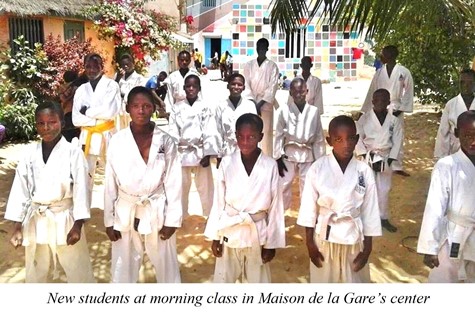
Amadou was born into a poor family and was sent to a Quranic school in Saint Louis at the age
of six. However, the “school” turned out to be a place where children are exploited and forced
to beg in the streets for their marabout. For Amadou, life was difficult and living conditions
were precarious.
Aliou, aged 12, was also sent to a daara in Saint Louis by his family in the hope that he would
get a Quranic education. However, he soon discovered that life at the daara where he was sent
to live was very different from what he had expected. He was forced to beg all day for food
and money. He was often mistreated by the marabout and the grands talibés, the older children
at his daara who often act as “enforcers” for the marabout. Aliou discovered
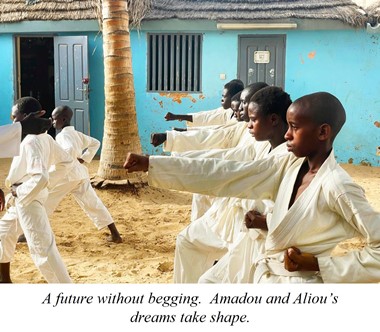 the karate program
by chance, hearing the sounds of children training. His curiosity led him to join the classes
and, since then, he has become a regular participant. He says karate has taught him to focus
and be disciplined. He is proud to show the skills he has learned to his friends and looks
forward to someday being able to show them to his family.
the karate program
by chance, hearing the sounds of children training. His curiosity led him to join the classes
and, since then, he has become a regular participant. He says karate has taught him to focus
and be disciplined. He is proud to show the skills he has learned to his friends and looks
forward to someday being able to show them to his family.
Aliou explains that karate has helped him to be strong and to defend himself, but also to respect
others and to be disciplined. Before karate he didn't have much hope for the future, but now he
knows he can achieve great things. Similarly for Amadou, karate has changed his life by giving
him a family at Maison de la Gare. He has friends who encourage him and teachers who push him
forward. He wants to keep training hard and perhaps someday to become a karate teacher himself.
For Amadou and Aliou, the karate program is more than just a physical activity. It's a way to
express themselves and build a strong identity while developing their self-confidence. Karate
has given them the hope and strength they need to overcome the difficulties of their lives as
begging talibés, and to pursue their dreams.
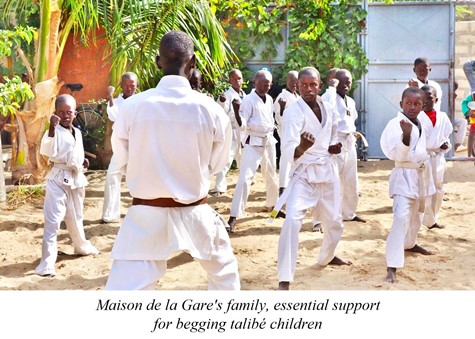
Aliou and Amadou's stories are examples of how Maison de la Gare’s karate program changes lives.
While offering the children a healthy and productive oasis from forced begging, the program
teaches them discipline, concentration, and self-confidence, skills invaluable both in the
practice of karate and in their daily lives. While learning karate techniques, the children
learn self-control, enabling them to manage their emotions and impulses in a positive,
non-violent way.
Maison de la Gare is a safe haven where these children can train, learn, grow, and pursue their
dreams as a family and a community, away from their lives as begging talibés. Thanks to your
support, we can offer them hope for a future away from the streets and their difficult lives
as begging talibés, while they develop new skills and build a strong identity.
_________
Note: The 43 older talibé children who practice many times each week at the Sor-Karaté dojo
are fully registered with the World Karate Federation, and they train under the supervision of
Sensei Ignéty Bâ. The program for the younger talibés in Maison de la Gare’s center is also
supervised by Sensei Bâ.

